|
 Iberian Warmblood Iberian Warmblood
|
|
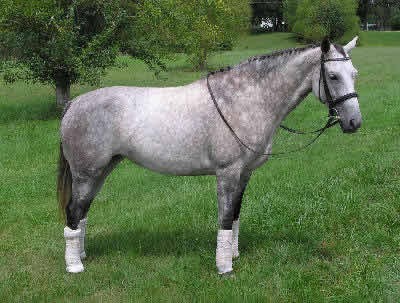 Iberian Warmbloods are sport horses that have a minimum of
25% Andalusian and/or Lusitano bloodlines from one or both of their parents.
The ancestors of these horses include the primitive Sorraia horse, which around
900 B.C., was mixed with horses from Northern Africa. The Sorraia, perhaps the
oldest breed of horse, is depicted in early cave paintings found on the Iberian
Peninsula.
Iberian Warmbloods are sport horses that have a minimum of
25% Andalusian and/or Lusitano bloodlines from one or both of their parents.
The ancestors of these horses include the primitive Sorraia horse, which around
900 B.C., was mixed with horses from Northern Africa. The Sorraia, perhaps the
oldest breed of horse, is depicted in early cave paintings found on the Iberian
Peninsula.
Breeders of dressage and show jumping horses have long been
seeking a way to breed a horse with greater sensitivity and a greater ability
for the collection required for piaffe, passage, and jumping. The Iberian blood
strengthens the horse''s soundness, athleticism, and versatility. When bred to
other breeds with the big stride for dress
...
|
 |
|
 Icelandic Icelandic
|
|
 Icelandic horses are one of the oldest horse breeds in the world.
They were brought to Iceland by the first settlers from Norway, in the late ninth
to early tenth centuries.
Icelandic horses are one of the oldest horse breeds in the world.
They were brought to Iceland by the first settlers from Norway, in the late ninth
to early tenth centuries.
Due to the harsh climate and the lack of vegetation over more
than one half of the country, the Icelandic horse had an extremely difficult existence.
Only the strongest and the fittest could survive.
As a result of a plague in Europe, Iceland quarantined itself
for many years. In AD 930 a law was passed to ban the importation of horses and
other animals into Iceland to keep out diseases. This had the effect of preserving
the purity of the Icelandic horses – they have never been crossbred with other horses
and have remained pure for over a t
...
|
 |
|
 Indian Country Bred Indian Country Bred
|
|
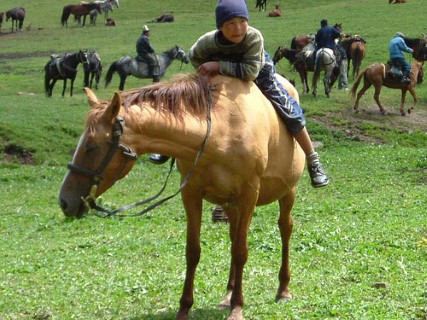 Indian Country Bred is the common name for a inter-bred
mixture of Bhutia Ponies, Spiti Ponies, and Tibetan Ponies. These animals have
been interbred for years so that many of the individual characteristics of the
Bhutia and Spiti have been lost, and they now are categorized as "Indian
Country Bred." They originated in the Himalayan region of India, and are
now found in the Buhtan, Sikkim, and Darjeeling regions of India.
Indian Country Bred is the common name for a inter-bred
mixture of Bhutia Ponies, Spiti Ponies, and Tibetan Ponies. These animals have
been interbred for years so that many of the individual characteristics of the
Bhutia and Spiti have been lost, and they now are categorized as "Indian
Country Bred." They originated in the Himalayan region of India, and are
now found in the Buhtan, Sikkim, and Darjeeling regions of India.
They were well suited to mountainous climate and terrain,
they are not as able to endure humidity and heat. In fact, they are given to
sun stroke and have trouble equalizing their internal temperature. A lack of
nutritious grasses generally affects the growth and development of these
ponies, althou
...
|
 |
|
 Iomud Iomud
|
|
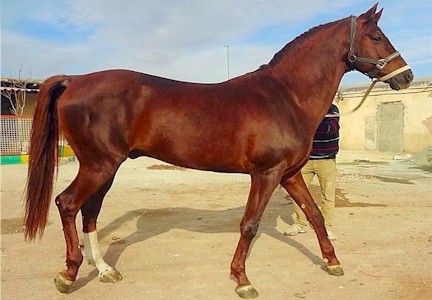 Iomuds are light horses from Turkmenistan. They are raised
in Turkmenistan, particularly in the velayat of Dasoguz; in Uzbekistan; in
Karakalpakstan (now part of Uzbekistan); and in Iraq, Iran and Turkey.
Iomuds are light horses from Turkmenistan. They are raised
in Turkmenistan, particularly in the velayat of Dasoguz; in Uzbekistan; in
Karakalpakstan (now part of Uzbekistan); and in Iraq, Iran and Turkey.
Like other breeds of Turkmen horses – including Akhal-Teke,
Ersari, Goklan, Salor and Sarik –Iomuds are named for the Turkmen tribe that
formed it, the Iomud. Both the name of the horse and the name of the Turkmen
clan may be spelt in many ways, including Iomud, Yomud, Yamud and Yomut. The
Iomud people occupy the northern part of modern Turkmenistan, from the eastern
shores of the Caspian Sea in the west to the area of Dasoguz, on the northern
edge of the Karakum Desert, in the north-east. They are principally
concentr
...
|
 |
|
 Irish Draught Irish Draught
|
|
 Irish Draught horses are native to Ireland. They are a light
draught breed that was historically developed for work on farms. Today they
have adapted to the ever-changing pace of equestrianism to become a very versatile
breed. As a foundation breed of the Irish Sport Horse, the Irish Draughts temperament
makes them easy to work with in any discipline. Along with characteristics of strength,
intelligence, courage, and light action they are an ideal equine to partner with
from amateur to professional rider.
Irish Draught horses are native to Ireland. They are a light
draught breed that was historically developed for work on farms. Today they
have adapted to the ever-changing pace of equestrianism to become a very versatile
breed. As a foundation breed of the Irish Sport Horse, the Irish Draughts temperament
makes them easy to work with in any discipline. Along with characteristics of strength,
intelligence, courage, and light action they are an ideal equine to partner with
from amateur to professional rider.
From the earliest times horses have always been a part of Irish
life. Over the years small active native horses were crossed with Norman horses
and Spanish Andalusian stallions to increase the size of the native breed. I
...
|
 |
|
 Irish Sport Irish Sport
|
|
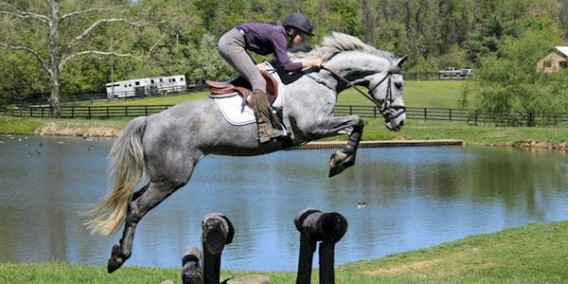 The Irish Sport Horse is considered Irelands, most successful
competition horse.The selective breeding
of Draught bloodlines with Sport horse breeds and thoroughbred produces a truly
exceptional equine athlete that excels and competes to the very highest levels in
equestrianism.Renowned worldwide for their
wonderful temperaments and wiliness to workthe Irish Sport horse is a horse of distinction.
The Irish Sport Horse is considered Irelands, most successful
competition horse.The selective breeding
of Draught bloodlines with Sport horse breeds and thoroughbred produces a truly
exceptional equine athlete that excels and competes to the very highest levels in
equestrianism.Renowned worldwide for their
wonderful temperaments and wiliness to workthe Irish Sport horse is a horse of distinction.
The Irish Sport Horse is considered Ireland’s most successful
competition horse.The selective breeding
of Draught bloodlines with Sport horse breeds and thoroughbred produces a truly
exceptional equine athlete that excels and competes to the very highest levels in
equestrianism.Renowned worldwide for their
wonderful temperament
...
|
 |
|
 Italian Heavy Draft Italian Heavy Draft
|
|
 Italian Heavy Draft, also known as Rapid Heavy Draft, horse
were developed in the 19th and 20th centuries using both draft and light horse
breeds, and are used mainly for heavy draft work and meat.
Italian Heavy Draft, also known as Rapid Heavy Draft, horse
were developed in the 19th and 20th centuries using both draft and light horse
breeds, and are used mainly for heavy draft work and meat.
Italian Heavy Draft were developed starting in 1860 at the
Deposito Cavalli Stalloni stud in Ferrara, Italy. They were developed from
crossing native Po Delta stallions with Thoroughbred, Hackney, and Arabian
horses. Around 1900, weight was added to the breed with the addition of
Boulonnais, Ardennes, and Norfolk-Breton blood. The breeding programs suffered
during World War II, but a careful crossbreeding program with Ardennes,
Percheron and Breton horses after the war brought the Italian Heavy Draft to
its current s
...
|
 |
|
 Italian Saddle Italian Saddle
|
|
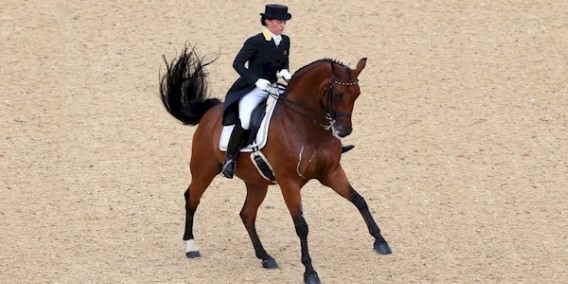 Italian saddle horses are
a recent creation and are excellent horses for show jumping, dressage, eventing,
endurance. They were created by crossing many Italian breeds, with the Sardinian
Anglo-Arab predominating. The aim has been to obtain a horse with a noble appearance
and the robustness typical to the descendants of English thoroughbreds, and the
reliability of the Italian breeds.
Italian saddle horses are
a recent creation and are excellent horses for show jumping, dressage, eventing,
endurance. They were created by crossing many Italian breeds, with the Sardinian
Anglo-Arab predominating. The aim has been to obtain a horse with a noble appearance
and the robustness typical to the descendants of English thoroughbreds, and the
reliability of the Italian breeds.
|
 |
|
 Italian TPR Agricultural Italian TPR Agricultural
|
|
 Italian TPR Agricultural
Horses are draught horses, characterised by a heavy frame and great development
of the muscles and the skeleton, are differentiated into slow heavy draught horses,
represented by the Belga breed, and fast heavy draught horses, represented by the
Italian Agricultural Horse. Thanks to its high speed of growth and the notable development
of its muscle mass, these alter are also particularly appropriate for the production
of meat.
Italian TPR Agricultural
Horses are draught horses, characterised by a heavy frame and great development
of the muscles and the skeleton, are differentiated into slow heavy draught horses,
represented by the Belga breed, and fast heavy draught horses, represented by the
Italian Agricultural Horse. Thanks to its high speed of growth and the notable development
of its muscle mass, these alter are also particularly appropriate for the production
of meat.
The Italian TPR Agricultural
Horse has its origin in the plane of Venice, Ferrara and Friuli. At first stallions
from Polesine were used, but later on English thoroughbred stallions were introduced,
along with Hackneys and Arab thoroughbreds. Around 1900 production was
...
|
 |
|
 Italian Trotter Italian Trotter
|
|
 The Italian Trotter
is a harness racing horse developed over the last century by crossing Thoroughbred
stallions with French (Norman) trotters, Russian Trotters and American Standardbred
mares. The goal of the selection was to blend the speed of the Standardbred with
the stamina of the French Trotter. The result is a large, physically powerful horse
standing up to 17 hands (68 inches, 173 cm) at the withers, with athletic ability
and capable of defeating Standardbreds on the race track.
The Italian Trotter
is a harness racing horse developed over the last century by crossing Thoroughbred
stallions with French (Norman) trotters, Russian Trotters and American Standardbred
mares. The goal of the selection was to blend the speed of the Standardbred with
the stamina of the French Trotter. The result is a large, physically powerful horse
standing up to 17 hands (68 inches, 173 cm) at the withers, with athletic ability
and capable of defeating Standardbreds on the race track.
The most famous Italian
trotting horse is certainly “Varenne”. He has won the equivalent of 6,400,000 euros
in prize-money.
He was born on May19TH
1995, the progeny of the stallion Waikiki Beach and the mare Ialmaz. Varenne is
...
|
 |

